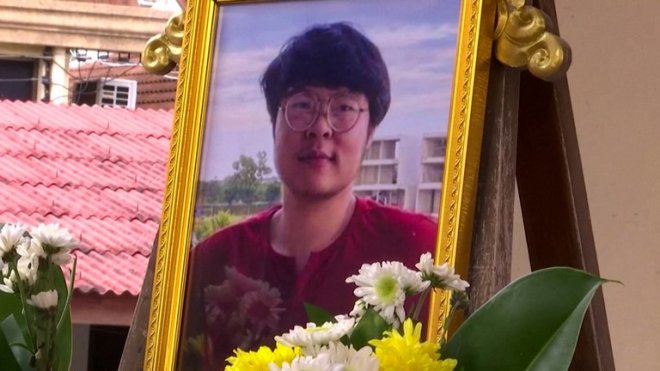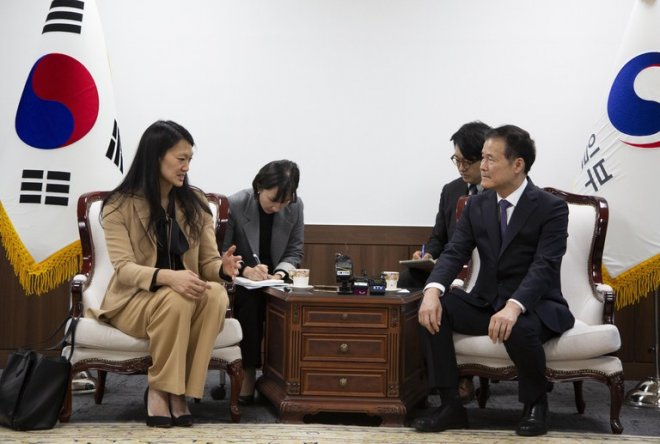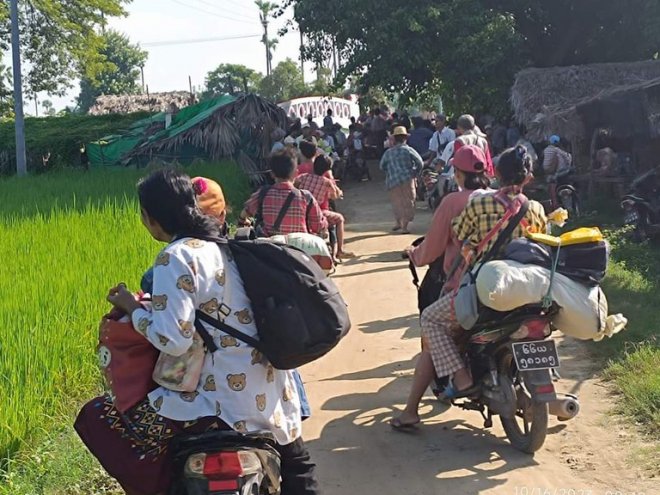Myanmar junta meets with ethnic rebels to garner support for 2023 elections
Myanmar’s junta met with three armed ethnic organizations over the weekend as part of a wider campaign to enlist support for an upcoming general election dismissed by democracy watchdogs as a military ploy to maintain power.
Leaders from the United Wa State Party, National Democratic Alliance Army, and Shan State Progressive Party – three rebel groups that have largely remained neutral in the country’s post-coup fray – met with officials from the military regime for three days of talks ending Saturday in the capital Naypyidaw.
The three groups based in Shan state, near northeastern Myanmar’s border with China, discussed their “political needs” and “building a Union based on democracy and the federal system” with the junta, according to a report by the official Global New Light of Myanmar.
Agence France-Presse quoted a spokesperson for the SSPP as saying that the military “asked us to let them hold free and fair elections in our area” and that the group “will not oppose” junta-led polls there this year.
Democracy activists and Western governments have dismissed the likelihood of the junta’s election – for which no date has been set – being free or fair. The military seized power from Myanmar’s democratically elected National League for Democracy government in a February 2021 coup and accused it of election fraud, although it has yet to present evidence of its claims. Political analysts say the junta intends to use a ballot to install a pro-military government.
While the junta has touted the weekend talks as a win, the three ethnic armies have been mostly aligned with the military and a peace process championed by the previous junta in 2011. While the trio have been involved in Myanmar’s decades-long conflict, they are not currently at war with the military and have even participated in peace negotiations and signed ceasefires with the government. Last month, the junta also met with five other smaller ethnic armies, who later issued a statement expressing support for the planned elections.
Other groups have condemned the ouster of the NLD and offered assistance and safe haven to anti-junta armed forces, including the People’s Defense Force paramilitary group.
Wanting a seat at the table
Last year, Myanmar’s four most powerful armed ethnic groups – the Kachin Independence Organisation, the Karen National Union, the Karenni National Progressive Party and the Chin National Front – rejected an olive branch from the junta, saying there can be no peace talks until the military regime allows the country’s shadow government and the PDF to take a seat at the table. They said that by not offering all stakeholders the chance to participate, the junta showed it is unwilling to meet halfway.
The junta has rejected requests from ethnic leaders and the international community to let the NUG and PDF participate in the talks. Military chief Senior General Min Aung Hlaing has repeatedly said that the junta will not talk with “terrorists,” and vowed to continue to crack down on the groups.
In addition to the four strongest armies, the other ethnic rebel groups to reject the invitation were the All Burma Students Democratic Front and the Lahu Democratic Union — two of the 10 groups that have signed a Nationwide Ceasefire Agreement with the government since 2015.
The United Wa State Party, the Shan State Progressive Party, and the National Democratic Alliance Army have agreed to join peace negotiations. So have the Arakan State Liberation Party, the Shan State Rehabilitation Council, the Karen National Peace Council, the Democratic Karen Army, the New Mon State Party and the Pa-O National Liberation Organization — all of which are members of the Peace Process Steering Team of Nationwide Ceasefire Agreement signatories.
The 10 groups that signed the NCA have suggested that the deal remains in place, despite an already flailing peace process that was all but destroyed by the coup. Previously, all 10 said they would not pursue talks with the military, which they view as having stolen power from the country’s democratically elected government.
![]() Myanmar junta chief Min Aung Hlaing meets with the new Chinese Special Envoy Deng Xijun in Naypyidaw on Dec. 29, 2022. Credit: Myanmar military
Myanmar junta chief Min Aung Hlaing meets with the new Chinese Special Envoy Deng Xijun in Naypyidaw on Dec. 29, 2022. Credit: Myanmar military![]() Chinese mediation
Chinese mediation
The meeting between the United Wa State Party, National Democratic Alliance Army, and Shan State Progressive Party and the junta over the weekend came a week after China’s new special envoy to Myanmar, Deng Xijun, met with Min Aung Hlaing.
The two discussed matters including Myanmar"s development, the status of peace talks with ethnic armed groups, China’s investment in the development of Myanmar, cooperation and increasing relations between the two countries, according to an official announcement following their Dec. 29 meeting.
Deng had met with the three ethnic armies across the border in China’s Yunnan province prior to his trip to Naypyidaw.
Thein Tun Oo, the executive director of Thayninga Institute for Strategic Studies, which is made up of former military officers, told RFA Burmese that China"s mediation is key to achieving peace with the ethnic groups.
“China"s mediation and political support is necessary to some extent in solving the issues of the ethnic armed forces, especially those who operate in the border areas between China and Myanmar,” he said. “Negotiation between China and Myanmar and China and these [groups] is essential.”
SSPP spokesperson Lieutenant Col. Sai Su told RFA amid the weekend talks that the group’s visit to Naypyidaw was “unrelated” to the Chinese special envoy, although he acknowledged that Deng “requested us to help stop the fighting that is happening across the country” when he met with them in Yunnan. Sai Su said the ethnic armies said that they alone could not end the violence and that the junta “must play a part.”
Reviewing cross-border relations
China and Russia have maintained ties with the military regime in the aftermath of the coup while other nations have sanctioned the junta or reduced diplomatic ties in response to its subsequent crackdown on dissent.
But political analyst Than Soe Naing suggested that China sent its special envoy to Myanmar to better understand the latter’s affairs and whether it needs to change its policy amid rising international pressure on the junta.
“The ‘Spring Revolution’ led by NUG is gaining momentum. On the other hand, the international pressure has increased quite a lot on the junta,” he said. “I assume that China sent the new envoy to learn if it needs to change its policy towards Myanmar in such a situation.”
On Dec. 21, the United Nations Security Council adopted a resolution that urges Myanmar’s military to stop the violence in Myanmar as soon as possible and to release all political prisoners, including deposed leader Aung San Suu Kyi. The U.S. National Defense Authorization Act (NDAA) - 2023, which will support Myanmar"s democratic forces, was signed into law by President Joe Biden on Dec. 23.
Other analysts noted that with hundreds of clashes having taken place along the China-Myanmar economic corridor since the coup, China appears concerned that continued instability could affect its investments in the country.
“China seems to understand that … it is no longer possible for the Myanmar military regime to handle political situations in the same way as before,” said political analyst Sai Kyi Zin Soe.
“As a neighboring country, the stability of Myanmar"s affairs may seriously impact its [investments]. Additionally, they seem to be aware that the changes in Myanmar"s relations with western countries may affect China"s interests more or less.”
According to ISP-Myanmar, the value of foreign investment in Myanmar totaled more than U.S. $4 billion from February 2021 to April 2022, more than two-thirds of which was Chinese.
Translated by Myo Min Aung. Edited by Joshua Lipes and Malcolm Foster.
[圖擷取自網路,如有疑問請私訊]
Leaders from the United Wa State Party, National Democratic Alliance Army, and Shan State Progressive Party – three rebel groups that have largely remained neutral in the country’s post-coup fray – met with officials from the military regime for three days of talks ending Saturday in the capital Naypyidaw.
The three groups based in Shan state, near northeastern Myanmar’s border with China, discussed their “political needs” and “building a Union based on democracy and the federal system” with the junta, according to a report by the official Global New Light of Myanmar.
Agence France-Presse quoted a spokesperson for the SSPP as saying that the military “asked us to let them hold free and fair elections in our area” and that the group “will not oppose” junta-led polls there this year.
Democracy activists and Western governments have dismissed the likelihood of the junta’s election – for which no date has been set – being free or fair. The military seized power from Myanmar’s democratically elected National League for Democracy government in a February 2021 coup and accused it of election fraud, although it has yet to present evidence of its claims. Political analysts say the junta intends to use a ballot to install a pro-military government.
While the junta has touted the weekend talks as a win, the three ethnic armies have been mostly aligned with the military and a peace process championed by the previous junta in 2011. While the trio have been involved in Myanmar’s decades-long conflict, they are not currently at war with the military and have even participated in peace negotiations and signed ceasefires with the government. Last month, the junta also met with five other smaller ethnic armies, who later issued a statement expressing support for the planned elections.
Other groups have condemned the ouster of the NLD and offered assistance and safe haven to anti-junta armed forces, including the People’s Defense Force paramilitary group.
Wanting a seat at the table
Last year, Myanmar’s four most powerful armed ethnic groups – the Kachin Independence Organisation, the Karen National Union, the Karenni National Progressive Party and the Chin National Front – rejected an olive branch from the junta, saying there can be no peace talks until the military regime allows the country’s shadow government and the PDF to take a seat at the table. They said that by not offering all stakeholders the chance to participate, the junta showed it is unwilling to meet halfway.
The junta has rejected requests from ethnic leaders and the international community to let the NUG and PDF participate in the talks. Military chief Senior General Min Aung Hlaing has repeatedly said that the junta will not talk with “terrorists,” and vowed to continue to crack down on the groups.
In addition to the four strongest armies, the other ethnic rebel groups to reject the invitation were the All Burma Students Democratic Front and the Lahu Democratic Union — two of the 10 groups that have signed a Nationwide Ceasefire Agreement with the government since 2015.
The United Wa State Party, the Shan State Progressive Party, and the National Democratic Alliance Army have agreed to join peace negotiations. So have the Arakan State Liberation Party, the Shan State Rehabilitation Council, the Karen National Peace Council, the Democratic Karen Army, the New Mon State Party and the Pa-O National Liberation Organization — all of which are members of the Peace Process Steering Team of Nationwide Ceasefire Agreement signatories.
The 10 groups that signed the NCA have suggested that the deal remains in place, despite an already flailing peace process that was all but destroyed by the coup. Previously, all 10 said they would not pursue talks with the military, which they view as having stolen power from the country’s democratically elected government.
 Myanmar junta chief Min Aung Hlaing meets with the new Chinese Special Envoy Deng Xijun in Naypyidaw on Dec. 29, 2022. Credit: Myanmar military
Myanmar junta chief Min Aung Hlaing meets with the new Chinese Special Envoy Deng Xijun in Naypyidaw on Dec. 29, 2022. Credit: Myanmar military Chinese mediation
Chinese mediationThe meeting between the United Wa State Party, National Democratic Alliance Army, and Shan State Progressive Party and the junta over the weekend came a week after China’s new special envoy to Myanmar, Deng Xijun, met with Min Aung Hlaing.
The two discussed matters including Myanmar"s development, the status of peace talks with ethnic armed groups, China’s investment in the development of Myanmar, cooperation and increasing relations between the two countries, according to an official announcement following their Dec. 29 meeting.
Deng had met with the three ethnic armies across the border in China’s Yunnan province prior to his trip to Naypyidaw.
Thein Tun Oo, the executive director of Thayninga Institute for Strategic Studies, which is made up of former military officers, told RFA Burmese that China"s mediation is key to achieving peace with the ethnic groups.
“China"s mediation and political support is necessary to some extent in solving the issues of the ethnic armed forces, especially those who operate in the border areas between China and Myanmar,” he said. “Negotiation between China and Myanmar and China and these [groups] is essential.”
SSPP spokesperson Lieutenant Col. Sai Su told RFA amid the weekend talks that the group’s visit to Naypyidaw was “unrelated” to the Chinese special envoy, although he acknowledged that Deng “requested us to help stop the fighting that is happening across the country” when he met with them in Yunnan. Sai Su said the ethnic armies said that they alone could not end the violence and that the junta “must play a part.”
Reviewing cross-border relations
China and Russia have maintained ties with the military regime in the aftermath of the coup while other nations have sanctioned the junta or reduced diplomatic ties in response to its subsequent crackdown on dissent.
But political analyst Than Soe Naing suggested that China sent its special envoy to Myanmar to better understand the latter’s affairs and whether it needs to change its policy amid rising international pressure on the junta.
“The ‘Spring Revolution’ led by NUG is gaining momentum. On the other hand, the international pressure has increased quite a lot on the junta,” he said. “I assume that China sent the new envoy to learn if it needs to change its policy towards Myanmar in such a situation.”
On Dec. 21, the United Nations Security Council adopted a resolution that urges Myanmar’s military to stop the violence in Myanmar as soon as possible and to release all political prisoners, including deposed leader Aung San Suu Kyi. The U.S. National Defense Authorization Act (NDAA) - 2023, which will support Myanmar"s democratic forces, was signed into law by President Joe Biden on Dec. 23.
Other analysts noted that with hundreds of clashes having taken place along the China-Myanmar economic corridor since the coup, China appears concerned that continued instability could affect its investments in the country.
“China seems to understand that … it is no longer possible for the Myanmar military regime to handle political situations in the same way as before,” said political analyst Sai Kyi Zin Soe.
“As a neighboring country, the stability of Myanmar"s affairs may seriously impact its [investments]. Additionally, they seem to be aware that the changes in Myanmar"s relations with western countries may affect China"s interests more or less.”
According to ISP-Myanmar, the value of foreign investment in Myanmar totaled more than U.S. $4 billion from February 2021 to April 2022, more than two-thirds of which was Chinese.
Translated by Myo Min Aung. Edited by Joshua Lipes and Malcolm Foster.
[圖擷取自網路,如有疑問請私訊]
|
本篇 |
不想錯過? 請追蹤FB專頁! |
| 喜歡這篇嗎?快分享吧! |
相關文章
AsianNewsCast

















